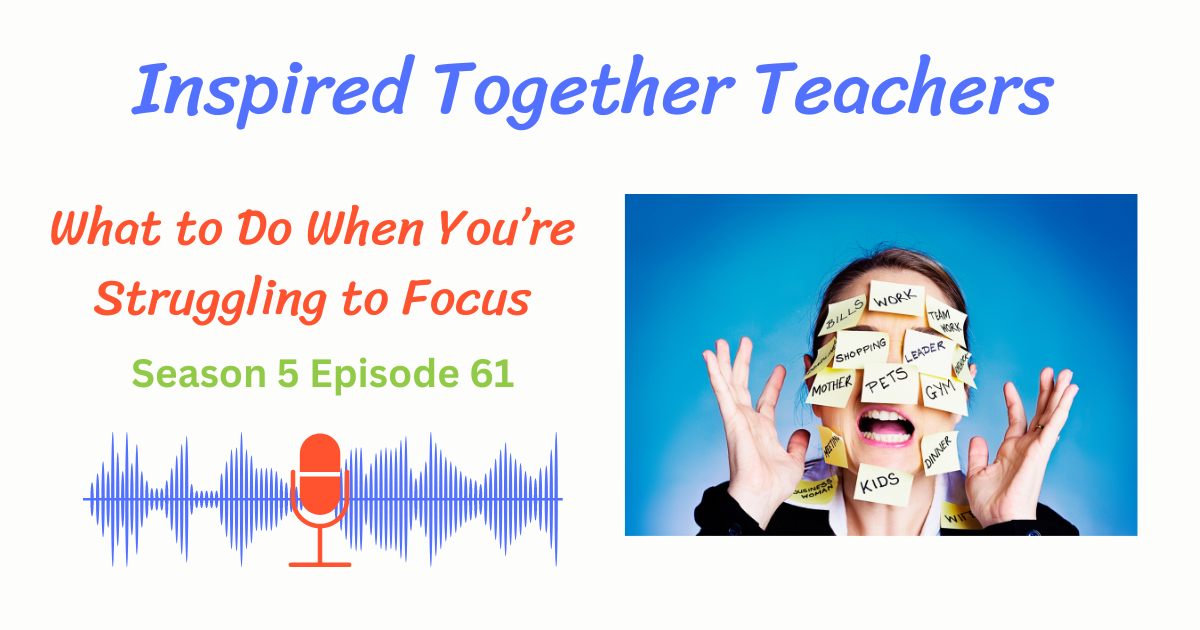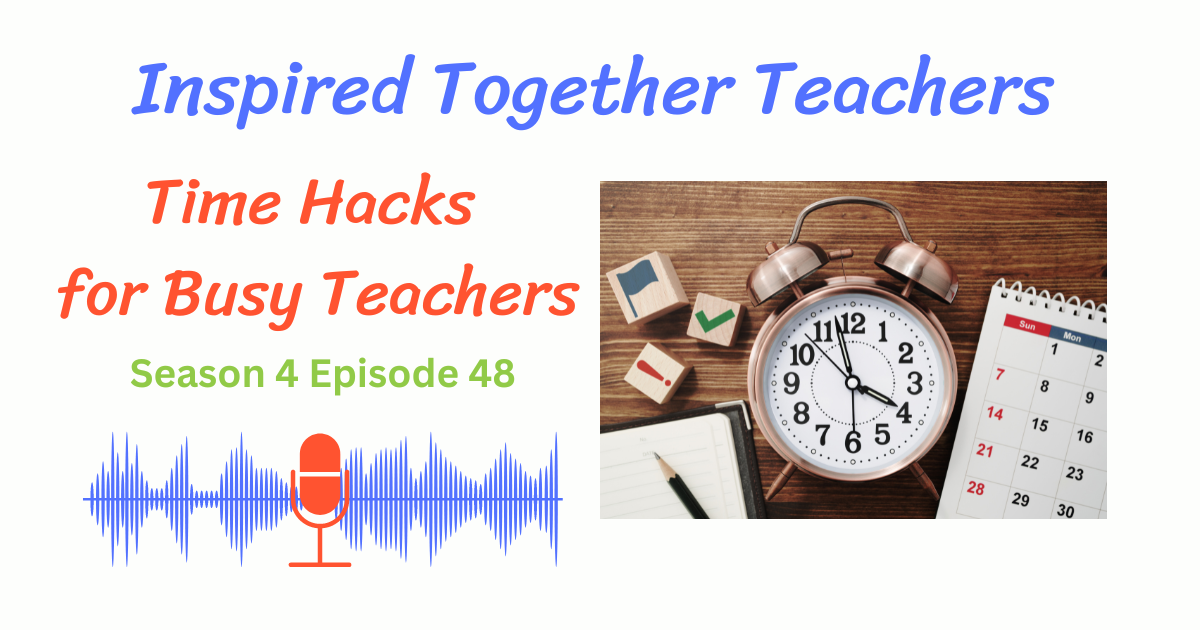What to Do When You’re Struggling to Focus
S. 5 E. 61
 Listen to this episode to find ways to improve your focus and get more done with fewer distractions.
Listen to this episode to find ways to improve your focus and get more done with fewer distractions.
Show notes:
Episode Summary:
We live in a society that makes it difficult to focus. Visual and audio stimulation surrounds us. Think about it, how long can you go without a phone call, text or notification on your phone? How long before you are interrupted by someone needing something? We are also plagued with too much to do, not enough time to do it, and the myth that multi-tasking will help us get it all done.
We need to focus.
Today we’re going to talk about things you can do to improve your focus and get more done with fewer distractions.
In this episode:
The following is not a word for word script of the podcast. During the podcast we talk back and forth and share stories and examples. For the complete content, listen to the podcast. Below you will find an outline with key points.
Introduction:
Distractions practically scream at us, “Stop! Pay attention to me!” Distractions are difficult to ignore and so we flit from thing to thing, switching gears midflight, stopping one thing to attend to another and finishing nothing. It is ineffective and unproductive.
Wallowing and feeling sorry for yourself isn’t going to help. Nor is endlessly scrolling. You can’t do ten things at once or try to move forward by tackling everything in sight.
Well, put your records on- it’s time to rock and roll!
Here are our suggestions to increase focus, regain energy, and get momentum moving forward again:
Sleep.
It’s a lot harder to get things when you are exhausted. Trying to do more by sleeping less is like trying to fill a bucket with a whole in the bottom. It isn’t going to happen. Sometimes we are overwhelmed by tasks because we are physically tired! Prioritizing sleep may help.
Eat that frog.
This idea, based on the book with the same name by Brian Tracy, is that if you do the most important, most difficult, and biggest tasks the first thing in the morning, the rest of the day gets easier.
Time Block.
Build out weekly calendars with time blocks including time for projects, phone calls, emails and other routine tasks. Plan out your prep times. Build in social time and relaxation time. A time blocked calendar helps you easily see the times for work and for play, and it is easier to work hard knowing when a break is coming up or when you will have time for yourself.
Group like things.
We’ve talked about this one before, and that is because it is really effective. Along with time blocking is the idea of grouping like items together and accomplishing them as a group rather than as a bunch of individual items. For example, group all of your emails and polish them off in one sitting. Make a list of all of your errands and then do them all together rather than dividing them out throughout the week.
If you haven’t tried grouping like items and tackling them as one block, give it a try. It is magical.
Get up and move.
Sometimes you need to allow yourself to get up and move. When your big muscles, like the ones in your thighs, are moving, they are pumping blood to your heart. More blood circulation means more oxygen flows to the brain and more oxygen can’t help but improve your thinking.
Moving is good for the brain. If you are stuck and can’t focus, try getting up and moving around for a couple of minutes.
Another idea is to try a standing desk. Or set 15 minute blocks to accomplish things that include movement such as folding laundry or picking up around the classroom.
Stay hydrated.
Dehydration impairs our ability to think and to focus. This is an idea that seems obvious, but it is easy to ignore our need for water when we get busy.
In schools, we often give water to students before they take standardized tests. Many teachers keep a water bottle on their desk so they can stay hydrated. If you aren’t already doing this, give it a try.
There are also apps that will help you track your water. If you are a visual person or like to complete with your results from the day or week before, consider downloading an app that will track your water drinking.
We also have a habit tracker where you can keep track of your water, sleep or any other habits in our book, The Inspired Teachers Journal: A Weekly Guide to Your Best Self.
Use noise to your advantage.
Many people like to listen to soft music or other sounds in the background as they work. Try gentle water sounds, soft drum beats or other ambient noise. Set a timer for the number of minutes you have to work. Often, before you realize how long you have been working, a bell lets you know time is up.
You may also want to play music or a podcast to help pass the time quickly when you are doing tasks that aren’t fun but that need to be done. If you can batch those tasks and play fun music or an inspirational podcast, you will be amazing at how quickly the time will pass and how much less distracted you will be.
Enjoy guilt free downtime.
When you have a lot to do, it feels like you should be doing something. However, if you allow yourself a few hours with a good TV show or book, you will probably have an improved attitude towards your work. Give yourself the gift of guilt free downtime. You will likely find that you come back to your work feeling refreshed and get more done in less time.
Try the Pomodoro Technique.
We’ve also talked about this one before. Set a timer, or your watch, for 25 minutes and work on a task. When the timer goes off, get up and move for five minutes. Then repeat the process as needed. When you know you are going to work for 25 minutes, you can usually accept that, get started, and focus for 25 minutes. Sometimes that’s all it takes to be more productive.
You can also create a nice combination of several of the strategies we already mentioned. Work on a task for 25 minutes, then in your 5 minutes of movement get up and move, hydrate, listen to fun music and have a little dance party! Focus on joy for those 5 minutes to you are refreshed for the next 25 minutes of tasks.
Conclusion:
There are seasons in our lives when we have heavy workloads or big projects to accomplish. Just when you need to focus, you sometimes find that you can’t get anything accomplished. It takes a more purposeful focus to accomplish things during times of stress, but it is possible to work through a seemingly insurmountable workload and get things done.
We end with this quote from Daniel Goleman:
“One way to boost our will power and focus is to manage our distractions instead of letting them manage us.”
Recap:
We all have times when we struggle to focus, which leads to procrastination and overwhelm. You can learn to improve your focus with self-care activities, talking time to enjoying something fun, and learning to time block and batch your work. You can take advice from experts and Eat That Frog, or try a technique such as the Pomodoro Technique. There are strategies you can easily adopt to help you improve your focus and get those to-do things crossed off your list.
Quote:
“One way to boost our will power and focus is to manage our distractions instead of letting them manage us.”
Daniel Goleman
Resources mentioned in this episode:
Books:
The Inspired Teachers Journal: A Weekly Guide to Your Best Self
Connect with the Inspired Together Teachers Community:
Website: https:www.inspiredtogetherteachers.com
Instagram: Inspired-Together-Teachers
Facebook: Inspired Together Teachers
Facebook Teacher Warriors Group: Teacher Warriors Facebook Group
Linked In: Inspired Together Learning
More About Inspired Together Teachers:
Are you a teacher struggling to balance your best work with your best life?
If you are dedicated and caring but often overwhelmed and exhausted, join us at Inspired Together Teachers. We’ll give you inspiration, strategies and tips that help you navigate life’s challenges as a stronger, more confident, and more joy filled person, both in and out of the classroom.
Inspired Together Teachers will give you practical tools to experience more of what matters most in your life.
Co-hosts Paula Schmidt and Michele Vosberg are award winning educators with the experience and skills to help teachers thrive in life and work. They’ve taught at all levels, worked with thousands of teachers, and conducted workshops around the world. They are also the authors of the #1 best-selling book The Inspired Teachers Journal: A Weekly Guide to Becoming Your Best Self.
Paula and Michele would love to have you to join them on their quest to lived inspired lives.




 You’ve made it through Halloween. Welcome to November! In our experience, November can be overwhelming and even depressing but you can thrive in November.
You’ve made it through Halloween. Welcome to November! In our experience, November can be overwhelming and even depressing but you can thrive in November.
